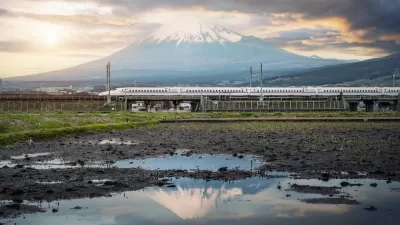Maglev trains owned by Central Japan Railway were clocked traveling at speeds of 603 km/h, less than week after traveling 590 km/h to set a record last set in 2003.
"Japan has again demonstrated its prowess in high-speed rail travel with its state-of-the-art maglev train setting a world record of just over 600km/h (373mph), just days after it broke its previous 12-year-old record," reports Justin McCurry.
"The seven-car maglev – short for 'magnetic levitation' – reached a top speed of 603km/h on Tuesday during what officials described as a 'comfortable' zip along a test track near Mount Fuji."
Central Japan Railway, a private rail company hoping to attract investors overseas in addition to at home, achieved the records using its Lo Series train. There is a long way to get yet, however, until maglev service is launched in Japan. Maglev is planned for operation by 2027, between Tokyo and Nagoya, 286km away. And "[b]y 2045 maglev trains are expected to cover the 410km between Tokyo and Osaka in one hour and seven minutes, cutting the journey time in half," according to McCurry. High costs—$100 billion for the Tokyo-Nagoya line, for instance—are causes for concern.
FULL STORY: Japan's maglev train breaks world speed record with 600km/h test run

Planetizen Federal Action Tracker
A weekly monitor of how Trump’s orders and actions are impacting planners and planning in America.

Maui's Vacation Rental Debate Turns Ugly
Verbal attacks, misinformation campaigns and fistfights plague a high-stakes debate to convert thousands of vacation rentals into long-term housing.

San Francisco Suspends Traffic Calming Amidst Record Deaths
Citing “a challenging fiscal landscape,” the city will cease the program on the heels of 42 traffic deaths, including 24 pedestrians.

Amtrak Rolls Out New Orleans to Alabama “Mardi Gras” Train
The new service will operate morning and evening departures between Mobile and New Orleans.

The Subversive Car-Free Guide to Trump's Great American Road Trip
Car-free ways to access Chicagoland’s best tourist attractions.

San Antonio and Austin are Fusing Into one Massive Megaregion
The region spanning the two central Texas cities is growing fast, posing challenges for local infrastructure and water supplies.
Urban Design for Planners 1: Software Tools
This six-course series explores essential urban design concepts using open source software and equips planners with the tools they need to participate fully in the urban design process.
Planning for Universal Design
Learn the tools for implementing Universal Design in planning regulations.
Heyer Gruel & Associates PA
JM Goldson LLC
Custer County Colorado
City of Camden Redevelopment Agency
City of Astoria
Transportation Research & Education Center (TREC) at Portland State University
Jefferson Parish Government
Camden Redevelopment Agency
City of Claremont



























